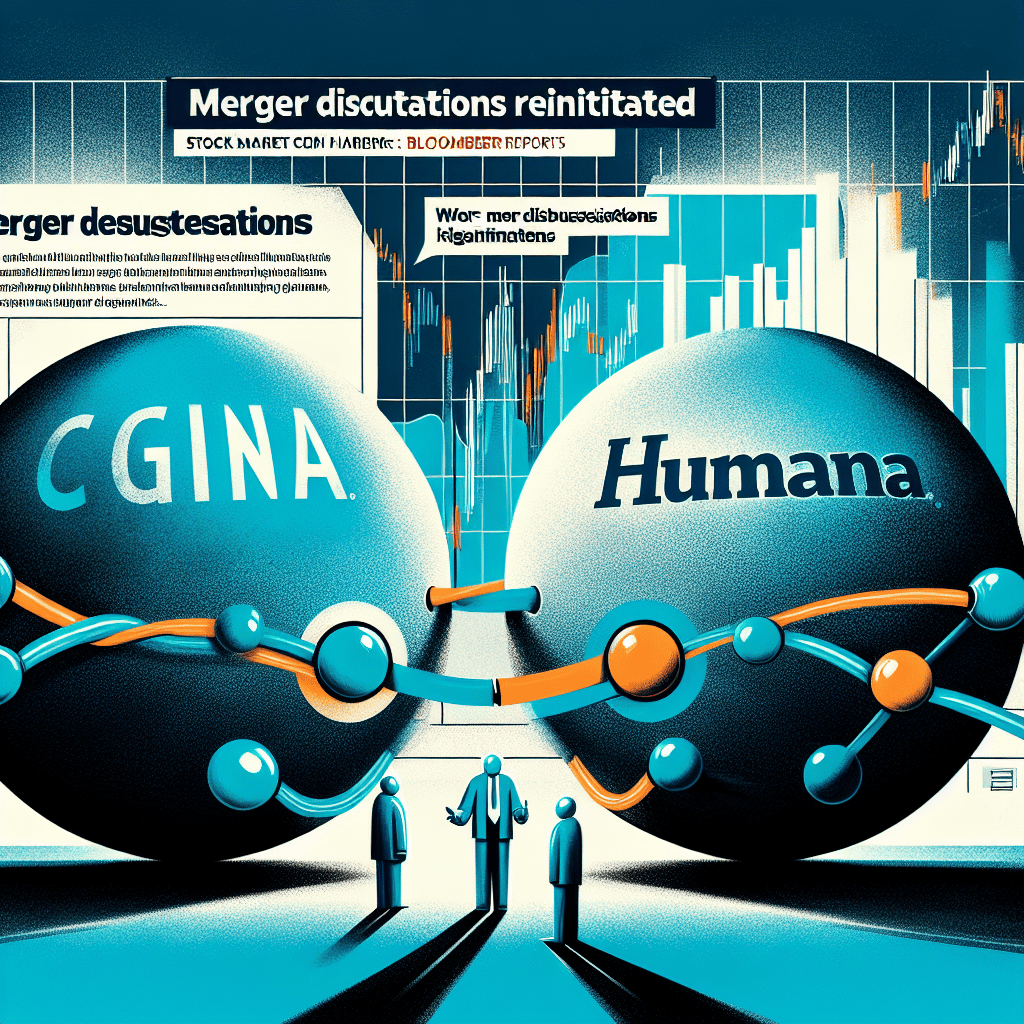“Reviving Synergies: Cigna and Humana Reignite Merger Talks”
Introduction
Cigna, a global health services company, has reportedly reinitiated merger discussions with Humana, a leading health and well-being company, according to Bloomberg. This development marks a significant potential consolidation in the healthcare industry, as both companies explore strategic options to enhance their market positions and expand their service offerings. The renewed talks come amid a rapidly evolving healthcare landscape, where companies are seeking to leverage synergies and scale to better compete and innovate. The merger, if successful, could reshape the competitive dynamics of the sector, impacting stakeholders ranging from consumers to healthcare providers.
Overview Of Cigna’s Merger History With Humana
In the ever-evolving landscape of the healthcare industry, mergers and acquisitions have become a strategic tool for companies seeking to enhance their market position and expand their service offerings. One such potential merger that has captured the attention of industry analysts and stakeholders alike is the renewed discussion between Cigna and Humana. According to a recent report by Bloomberg, Cigna has reinitiated merger discussions with Humana, signaling a possible consolidation that could have significant implications for the healthcare sector.
To understand the current developments, it is essential to delve into the history of Cigna’s merger attempts with Humana. The relationship between these two healthcare giants has been marked by a series of negotiations and strategic considerations, reflecting the complexities and challenges inherent in such large-scale mergers. Historically, Cigna and Humana have explored the possibility of merging as a means to leverage their combined strengths, enhance their competitive edge, and deliver more comprehensive healthcare solutions to their customers.
The initial discussions between Cigna and Humana date back several years, during a period when the healthcare industry was experiencing a wave of consolidation. At that time, both companies recognized the potential benefits of merging, including increased bargaining power with healthcare providers, expanded geographic reach, and the ability to offer a broader range of insurance products. However, despite the apparent synergies, the merger talks faced significant hurdles, including regulatory scrutiny and antitrust concerns, which ultimately led to the suspension of negotiations.
In the intervening years, the healthcare landscape has continued to evolve, driven by factors such as technological advancements, changing consumer expectations, and regulatory shifts. These dynamics have prompted Cigna and Humana to revisit the possibility of a merger, as they seek to adapt to the changing environment and position themselves for future growth. The renewed discussions, as reported by Bloomberg, suggest that both companies are once again evaluating the strategic fit and potential benefits of a merger.
One of the key motivations behind the renewed merger talks is the desire to achieve greater scale and operational efficiencies. By combining their resources and capabilities, Cigna and Humana could potentially reduce costs, streamline operations, and enhance their ability to invest in innovative healthcare solutions. Moreover, a merger could enable the companies to better navigate the complexities of the healthcare market, including the ongoing shift towards value-based care and the increasing emphasis on patient-centered services.
While the potential merger between Cigna and Humana holds promise, it is not without its challenges. Regulatory approval remains a significant hurdle, as antitrust authorities closely scrutinize large-scale mergers to ensure they do not stifle competition or harm consumers. Additionally, integrating two large organizations with distinct cultures and operational structures presents its own set of challenges, requiring careful planning and execution to achieve a successful merger.
In conclusion, the reinitiation of merger discussions between Cigna and Humana represents a significant development in the healthcare industry. As both companies explore the potential benefits and challenges of a merger, stakeholders will be closely monitoring the progress of these negotiations. Should the merger come to fruition, it could reshape the competitive landscape of the healthcare sector, offering new opportunities and challenges for both companies and their customers. As the situation unfolds, the industry will be keenly observing how Cigna and Humana navigate the complexities of this potential consolidation, and what it means for the future of healthcare delivery.
Potential Impacts Of The Cigna-Humana Merger On The Healthcare Industry
The healthcare industry is once again abuzz with the news that Cigna has reinitiated merger discussions with Humana, as reported by Bloomberg. This potential merger, if realized, could have significant implications for the healthcare landscape, affecting stakeholders ranging from patients and healthcare providers to insurance companies and policymakers. As the industry grapples with ongoing challenges such as rising costs, regulatory changes, and the need for improved patient outcomes, the merger of two major players like Cigna and Humana could reshape the competitive dynamics and operational strategies within the sector.
To begin with, the merger could lead to a substantial consolidation in the health insurance market. Cigna and Humana, both giants in their own right, bring to the table a vast array of resources, networks, and expertise. By combining their strengths, the merged entity could potentially offer more comprehensive and competitive insurance products. This could result in increased bargaining power with healthcare providers, potentially leading to more favorable pricing structures and cost efficiencies. However, it is crucial to consider that such consolidation might also reduce competition, which could have adverse effects on consumer choice and pricing in the long run.
Moreover, the merger could drive innovation in healthcare delivery and management. Both Cigna and Humana have been at the forefront of integrating technology into their operations, focusing on data analytics, telemedicine, and personalized healthcare solutions. A merger could accelerate these initiatives, allowing for more robust data sharing and the development of innovative care models that prioritize preventive care and chronic disease management. This could ultimately lead to improved patient outcomes and a more sustainable healthcare system.
On the other hand, the merger could face significant regulatory scrutiny. Antitrust concerns are likely to be at the forefront of any discussions, as regulators will closely examine the potential impact on market competition and consumer welfare. The healthcare industry has seen a wave of mergers and acquisitions in recent years, prompting regulators to adopt a more cautious approach to ensure that such consolidations do not lead to monopolistic practices or harm consumer interests. Therefore, Cigna and Humana will need to present a compelling case that demonstrates how their merger would benefit the broader healthcare ecosystem.
Furthermore, the merger could have implications for healthcare providers, including hospitals, clinics, and physicians. With a larger, more integrated insurance entity, providers may face increased pressure to align with the merged company’s care protocols and reimbursement models. This could necessitate adjustments in how care is delivered and managed, potentially leading to both opportunities and challenges for providers. While some may benefit from streamlined processes and enhanced collaboration, others might struggle with the increased administrative burden and potential changes in reimbursement rates.
In conclusion, the reinitiated merger discussions between Cigna and Humana represent a pivotal moment for the healthcare industry. The potential impacts of such a merger are multifaceted, with the promise of enhanced efficiencies and innovation balanced against concerns over market competition and regulatory hurdles. As the discussions progress, stakeholders across the healthcare spectrum will be closely monitoring developments, eager to understand how this potential merger could shape the future of healthcare delivery and insurance. Ultimately, the outcome of these discussions will have far-reaching consequences, influencing the strategic direction of the industry and the experiences of patients and providers alike.
Regulatory Challenges Facing The Cigna-Humana Merger
In recent developments, Cigna has reportedly reinitiated merger discussions with Humana, a move that has captured the attention of industry analysts and regulatory bodies alike. This potential merger, if successful, would significantly reshape the landscape of the American healthcare insurance market. However, the path to such a consolidation is fraught with regulatory challenges that both companies must navigate carefully. Understanding these challenges is crucial to assessing the feasibility and potential impact of the merger.
To begin with, antitrust concerns are at the forefront of regulatory scrutiny. The healthcare insurance market in the United States is already dominated by a few major players, and a merger between Cigna and Humana would further consolidate this market. The Department of Justice (DOJ) and the Federal Trade Commission (FTC) are likely to examine the merger closely to ensure it does not stifle competition or harm consumers. Historically, these regulatory bodies have been vigilant in preventing monopolistic practices, as evidenced by their intervention in previous high-profile mergers within the industry. Therefore, Cigna and Humana must prepare to demonstrate that their merger would not lead to unfair market dominance or reduced consumer choice.
Moreover, the merger would need to address concerns related to consumer pricing. One of the primary arguments against large-scale mergers in the healthcare sector is the potential for increased premiums and reduced benefits for policyholders. Regulators will likely demand assurances that the merger will not lead to higher costs for consumers. Cigna and Humana would need to present a compelling case that their combined operations would lead to efficiencies and cost savings that could be passed on to consumers, rather than resulting in price hikes.
In addition to antitrust and pricing issues, the merger must also consider the implications for Medicare Advantage plans. Humana is a significant player in the Medicare Advantage market, and any changes in its operations could have widespread effects on millions of beneficiaries. Regulators will be keen to ensure that the merger does not disrupt services or reduce the quality of care for these individuals. Cigna and Humana will need to work closely with the Centers for Medicare & Medicaid Services (CMS) to address any potential concerns and ensure compliance with federal regulations governing these plans.
Furthermore, the merger discussions must also take into account the broader regulatory environment, which is subject to change based on political and economic factors. Healthcare policy in the United States is a dynamic field, influenced by shifts in administration and legislative priorities. As such, Cigna and Humana must remain adaptable and responsive to any changes in regulatory requirements that could arise during the merger process.
In conclusion, while the potential merger between Cigna and Humana presents opportunities for growth and innovation within the healthcare insurance market, it also faces significant regulatory challenges. Antitrust concerns, consumer pricing implications, and the impact on Medicare Advantage plans are just a few of the hurdles that must be addressed. As these discussions progress, both companies will need to engage proactively with regulatory bodies, ensuring that their merger aligns with legal standards and serves the best interests of consumers. Only by navigating these complex regulatory landscapes can Cigna and Humana hope to achieve a successful merger that benefits all stakeholders involved.
Financial Implications Of The Cigna And Humana Merger

The recent news of Cigna reinitiating merger discussions with Humana, as reported by Bloomberg, has sparked considerable interest in the financial implications of such a significant consolidation within the healthcare industry. This potential merger, if realized, could reshape the competitive landscape, offering both opportunities and challenges for stakeholders involved. To understand the financial ramifications, it is essential to consider the strategic motivations behind the merger, the potential cost synergies, and the broader market impact.
Firstly, the strategic motivations for Cigna and Humana to explore a merger are rooted in the evolving dynamics of the healthcare sector. Both companies are major players in the health insurance market, and a merger would allow them to leverage their combined resources to enhance their competitive positioning. By joining forces, Cigna and Humana could expand their market share, diversify their product offerings, and strengthen their negotiating power with healthcare providers. This strategic alignment could lead to increased revenue streams and improved profitability, which are critical financial objectives for both entities.
Moreover, the potential cost synergies resulting from the merger are a key financial consideration. Mergers of this magnitude often promise significant cost savings through economies of scale, streamlined operations, and reduced administrative expenses. For Cigna and Humana, integrating their operations could lead to more efficient use of resources, elimination of redundancies, and enhanced bargaining power with suppliers. These cost efficiencies could translate into substantial financial gains, potentially boosting the merged entity’s bottom line and delivering value to shareholders.
In addition to internal financial benefits, the merger could have broader market implications. The healthcare industry is characterized by intense competition and regulatory scrutiny, and a merger of this scale could prompt reactions from competitors and regulators alike. Competitors may respond by seeking their own strategic alliances or mergers to maintain their market positions, potentially leading to further consolidation within the industry. Meanwhile, regulatory bodies will likely scrutinize the merger to ensure compliance with antitrust laws and to assess its impact on consumer choice and pricing. Navigating these regulatory challenges will be crucial for Cigna and Humana to realize the anticipated financial benefits of the merger.
Furthermore, the merger could influence investor sentiment and stock market performance. Investors typically react to merger announcements with a mix of optimism and caution, weighing the potential for increased profitability against the risks associated with integration and execution. The market’s response to the Cigna-Humana merger discussions will depend on various factors, including the perceived strategic fit, the clarity of the integration plan, and the anticipated timeline for realizing synergies. Positive investor sentiment could drive up the stock prices of both companies, while skepticism or uncertainty could lead to volatility.
In conclusion, the reinitiation of merger discussions between Cigna and Humana carries significant financial implications for both companies and the broader healthcare industry. The strategic motivations, potential cost synergies, and market impact of the merger are critical factors that will shape its success. As the discussions progress, stakeholders will closely monitor developments to assess the financial viability and long-term benefits of this potential consolidation. Ultimately, the outcome of these discussions will have far-reaching consequences, influencing not only the financial health of Cigna and Humana but also the competitive dynamics of the healthcare sector as a whole.
How The Cigna-Humana Merger Could Affect Consumers
In recent developments, Cigna has reportedly reinitiated merger discussions with Humana, according to Bloomberg. This potential merger between two of the largest health insurance companies in the United States could have significant implications for consumers. As the healthcare landscape continues to evolve, understanding the potential effects of such a merger is crucial for policyholders and stakeholders alike.
To begin with, a merger between Cigna and Humana could lead to increased market consolidation, which might have both positive and negative consequences for consumers. On one hand, the combined resources and expertise of these two companies could lead to improved efficiencies and potentially lower costs. By streamlining operations and reducing administrative redundancies, the merged entity might be able to offer more competitive pricing for insurance plans. This could be particularly beneficial for consumers who are currently facing rising healthcare costs and are in search of more affordable options.
Moreover, the merger could enhance the range of services available to consumers. Cigna and Humana each bring unique strengths to the table, with Cigna’s robust network of healthcare providers and Humana’s strong presence in the Medicare Advantage market. By joining forces, the merged company could offer a more comprehensive suite of services, catering to a broader spectrum of healthcare needs. This could result in more integrated care solutions, providing consumers with a more seamless healthcare experience.
However, it is important to consider the potential downsides of such a merger. Increased market consolidation could reduce competition, which might lead to higher prices in the long run. With fewer players in the market, there is a risk that the merged entity could wield significant pricing power, potentially leading to higher premiums for consumers. This is a concern that regulators are likely to scrutinize closely, as maintaining a competitive market is essential for ensuring that consumers have access to affordable healthcare options.
Furthermore, the merger could impact the level of choice available to consumers. With fewer insurance providers to choose from, consumers might find themselves with limited options when selecting a health plan. This could be particularly challenging for individuals with specific healthcare needs or preferences, as they may have to compromise on certain aspects of their coverage. Ensuring that consumers continue to have access to a diverse range of insurance products will be a key consideration for regulators as they evaluate the potential merger.
In addition to these considerations, the merger could also have implications for healthcare providers. A larger, more powerful insurance company might have greater leverage in negotiations with hospitals and doctors, potentially impacting reimbursement rates and the overall dynamics of provider-insurer relationships. This could have a trickle-down effect on consumers, influencing the availability and quality of care.
In conclusion, while the potential merger between Cigna and Humana presents opportunities for improved efficiencies and expanded services, it also raises concerns about market competition, pricing, and consumer choice. As discussions progress, it will be essential for regulators to carefully assess the potential impacts on consumers and the broader healthcare ecosystem. Ultimately, the goal should be to ensure that any merger benefits consumers by enhancing access to affordable, high-quality healthcare while preserving a competitive market environment.
Strategic Reasons Behind Cigna’s Renewed Interest In Humana
Cigna’s renewed interest in merging with Humana, as reported by Bloomberg, marks a significant development in the healthcare industry, reflecting strategic motivations that could reshape the landscape of health insurance. This potential merger is not merely a business transaction but a calculated move driven by the evolving dynamics of the healthcare sector. Understanding the strategic reasons behind Cigna’s interest in Humana requires an examination of the broader context in which these companies operate.
Firstly, the healthcare industry is undergoing rapid transformation, characterized by increasing consolidation among insurers. This trend is driven by the need to achieve economies of scale, enhance bargaining power with healthcare providers, and improve operational efficiencies. By merging with Humana, Cigna could significantly expand its market share, thereby strengthening its competitive position. This consolidation would allow Cigna to leverage Humana’s established presence in the Medicare Advantage market, a sector experiencing robust growth due to the aging population in the United States. Consequently, the merger would enable Cigna to diversify its portfolio and reduce its reliance on traditional commercial insurance markets.
Moreover, the potential merger aligns with Cigna’s strategic objective of enhancing its capabilities in value-based care. As the healthcare industry shifts from fee-for-service models to value-based care, insurers are increasingly focusing on improving patient outcomes while controlling costs. Humana’s expertise in managing Medicare Advantage plans, which emphasize preventive care and chronic disease management, would complement Cigna’s existing initiatives in this area. By integrating Humana’s capabilities, Cigna could accelerate its transition to value-based care models, ultimately delivering better healthcare outcomes for its members.
In addition to these strategic synergies, the merger could also provide Cigna with significant financial benefits. The combined entity would likely achieve substantial cost savings through the elimination of redundancies and the optimization of administrative functions. These efficiencies could translate into lower premiums for policyholders and increased profitability for the company. Furthermore, the merger would enhance Cigna’s ability to invest in innovative technologies and digital health solutions, which are becoming increasingly important in delivering personalized and efficient healthcare services.
However, it is essential to consider the regulatory landscape that could impact the merger’s feasibility. Previous attempts at consolidation in the healthcare industry have faced scrutiny from antitrust regulators concerned about reduced competition and potential harm to consumers. Therefore, Cigna and Humana would need to demonstrate that the merger would not only benefit shareholders but also enhance consumer choice and access to affordable healthcare. This may involve making concessions or divestitures to address regulatory concerns and ensure the merger’s approval.
In conclusion, Cigna’s renewed interest in merging with Humana is driven by strategic imperatives that reflect the changing dynamics of the healthcare industry. By pursuing this merger, Cigna aims to strengthen its market position, enhance its capabilities in value-based care, and achieve financial efficiencies. While regulatory challenges may arise, the potential benefits of the merger could be substantial, offering a pathway for Cigna to navigate the complexities of the evolving healthcare landscape. As discussions progress, stakeholders will closely monitor developments to assess the potential impact on the industry and consumers alike.
Expert Opinions On The Cigna-Humana Merger Discussions
The recent news that Cigna has reinitiated merger discussions with Humana, as reported by Bloomberg, has sparked a flurry of expert opinions and analyses within the healthcare and financial sectors. This potential merger, if realized, could significantly reshape the landscape of the health insurance industry, prompting a closer examination of its implications. Experts are weighing in on various aspects, from regulatory hurdles to market dynamics, offering a comprehensive view of what this merger could entail.
To begin with, industry analysts highlight the strategic motivations behind Cigna’s renewed interest in Humana. Both companies have complementary strengths that could create a more robust entity capable of competing with industry giants like UnitedHealth Group and Anthem. Cigna’s extensive network of healthcare providers and Humana’s strong presence in the Medicare Advantage market could synergize to offer a more diversified portfolio of services. This potential merger is seen as a strategic move to enhance competitiveness and expand market share, particularly in the rapidly growing Medicare Advantage sector.
However, the path to a successful merger is fraught with challenges, particularly in terms of regulatory scrutiny. Experts caution that antitrust regulators are likely to closely examine the merger to ensure it does not stifle competition or harm consumers. The healthcare industry has seen a wave of consolidation in recent years, and regulators have become increasingly vigilant in assessing the impact of such mergers. The Federal Trade Commission (FTC) and the Department of Justice (DOJ) will likely scrutinize the deal to ensure it aligns with antitrust laws and does not lead to monopolistic practices.
In addition to regulatory concerns, financial analysts are considering the economic implications of the merger. The integration of two large entities like Cigna and Humana would require significant financial resources and careful management to realize potential cost synergies and operational efficiencies. Experts suggest that while the merger could lead to cost savings through streamlined operations and reduced administrative expenses, the initial integration phase could be costly and complex. The success of the merger would depend on effective execution and the ability to harmonize corporate cultures and systems.
Furthermore, healthcare policy experts are contemplating the potential impact on consumers and the broader healthcare system. A merger of this magnitude could influence pricing, service offerings, and access to care. While some argue that increased scale could lead to more competitive pricing and improved services, others express concern that reduced competition could result in higher premiums and limited choices for consumers. The balance between achieving operational efficiencies and maintaining consumer welfare will be a critical consideration for both companies and regulators.
In conclusion, the reinitiation of merger discussions between Cigna and Humana has generated significant interest and debate among experts across various fields. While the potential benefits of such a merger are evident in terms of strategic positioning and market expansion, the challenges posed by regulatory scrutiny, financial integration, and consumer impact cannot be overlooked. As the discussions progress, stakeholders will be keenly observing how these factors unfold, shaping the future of the healthcare insurance industry. The outcome of these discussions will not only affect the companies involved but also have broader implications for the healthcare market and its consumers.
Q&A
1. **What companies are involved in the merger discussions?**
Cigna and Humana.
2. **Who reported the reinitiation of merger discussions?**
Bloomberg.
3. **What is the nature of the discussions between Cigna and Humana?**
Merger discussions.
4. **Why are Cigna and Humana considering a merger?**
To potentially expand their market presence and improve competitive positioning in the healthcare industry.
5. **Have Cigna and Humana attempted a merger before?**
Yes, they have had previous discussions about merging.
6. **What industry do Cigna and Humana operate in?**
The healthcare and insurance industry.
7. **What could be a potential outcome of the merger?**
A combined entity that could offer a broader range of healthcare services and insurance products, potentially leading to increased market share and operational efficiencies.
Conclusion
Cigna’s reinitiation of merger discussions with Humana, as reported by Bloomberg, signals a potential consolidation in the health insurance industry that could significantly impact market dynamics. Such a merger would combine Cigna’s extensive network and resources with Humana’s strong presence in the Medicare Advantage market, potentially enhancing competitive positioning and operational efficiencies. However, this move would likely face regulatory scrutiny due to antitrust concerns, given the potential reduction in competition. If successful, the merger could lead to improved service offerings and cost structures, but it also raises questions about consumer choice and market concentration.




